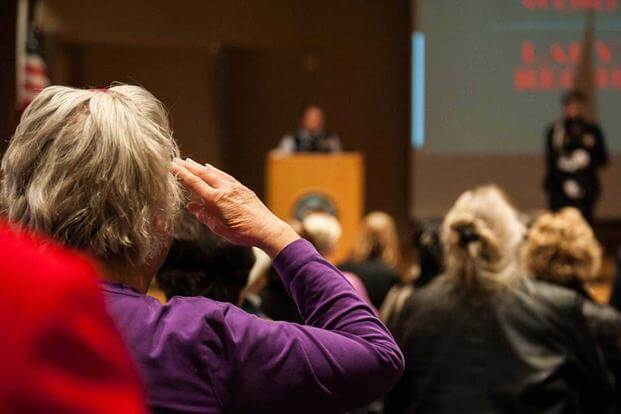VR Small is a Navy veteran, founder and executive director for the Veteran Women's Enterprise Center (VWEC).
Veteran-owned businesses are getting a lot of attention these days. But a subgroup of veteran entrepreneurs must contend with misaligned resources, a side effect of stereotypes in the general public about what it means to be a veteran.
With six women veterans in office on Capitol Hill, efforts are finally being made to bring long-overdue women veteran issues to the forefront. The creation of the Servicewomen and Women Veterans Congressional Caucus and the launch of the House Veteran Affairs Committee's new Women Veterans Task Force are a start at bringing these issues into focus.
But women veteran-owned businesses remain in the shadows. The problem is seen in the statistics. Women veteran-owned businesses (WVOBs) made up 15.2% of all veteran-owned businesses in 2015, according to Census Bureau statistics. About 97% of those businesses have no employees, but the 3% that do employ more than 100,000 workers and reported over $10 billion in receipts over a five-year reporting period.
That data, says the National Women’s Business Council, shows that growth in the sector is happening, but is only a fraction of what it could be.
"If veteran women-owned employer firms generated receipts proportional to their share of veteran-owned employer firms (3.3 percent), these firms would have receipts that stood at about $29.3 billion," the National Women's Business Council said in a 2017 report based on the Census Bureau's Annual Survey of Entrepreneurs. The council further found that for every dollar a male veteran makes in his business, a female veteran makes just $.07 in hers.
Why? One reason could be that resources available from various business-focused organizations and federal agencies often don't meet the immediate needs of WVOBs. Service types and locations are often not designed specifically with women in mind. And many agencies seem unwilling or unable to effectively and regularly engage WVOBs in developing the social and financial capital necessary to scale their businesses.
When we fail to effectively engage WVOBs, we lose the added value to our society of this highly diverse population that represents nearly every ethnicity, race, gender orientation and age group.
Statistics also suggest that support for WVOBs impacts more than just the business owner and their employees. According to statistics from Refinery29 and Chase, women in general are the primary breadwinners in 40% of households. This suggests that supporting women-owned business growth and self-sufficiency will ultimately help build stronger families, support thriving communities and add fuel to our nation's economy.
The time is now to turn up the volume so we can hear and respond more effectively to the often silent voices of female veterans.
These military women are trained to accomplish the mission using whatever resources are available, and they will rarely be the squeaky wheel that gets the oil. Instead, most will struggle in silence, never being given the opportunity to articulate what they truly need to succeed. And because many female veterans don't self-identify, the local business community assumes that women veteran-owned businesses represent a limited population. But that is yet to be proven.
There is a movement in the right direction. For example, one project taking on the charge of strengthening the voices of WVOBs is the Veteran Women's Enterprise Center (VWEC)'s "Moments that Matter" research project, in collaboration with the Dallas Federal Reserve Bank.
The Moments that Matter local survey focuses exclusively on engaging women veteran-owned businesses in the Dallas-Fort Worth area. WVOBs in all 13 counties are encouraged to turn up the volume and let their voices be heard by taking the survey.
While several surveys have been conducted for veteran-owned businesses in general, this local survey is designed to capture data that will clearly define transitional moments in these WVOBs' entrepreneur journey. That, in turn, will help identify and connect them to the resources they need to effectively scale their businesses. Those steps will ultimately help them build a vibrant entrepreneurial ecosystem that supports consistent access to essential social and financial capital.
The survey is also the VWEC's pilot project for the development of a regional and national tool that can be used to provide an annual report on the status of women veteran-owned businesses, keeping the volume up and tuned into their ongoing challenges and successes.
When we consider funding support to and for our veteran communities, we should consider women veteran-owned businesses' silent contributions as a potential gold mine, and it often pays to dig deeper, and invest more, if you really want to strike gold.
And as we work toward equality for all women, we must ensure that equity is instituted across the board. To effectively acknowledge and engage this group, we have to change the narrative.
When we say "veteran," we need to immediately envision men and women who have faithfully served our nation.
-- The opinions expressed in this op-ed are those of the author and do not necessarily reflect the views of Military.com. If you would like to submit your own commentary, please send your article to opinions@military.com for consideration.













